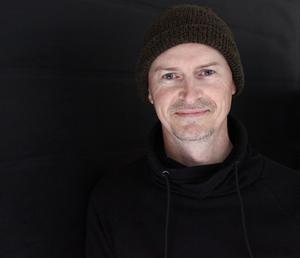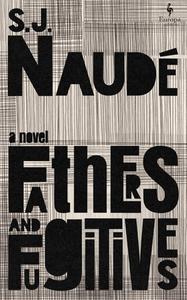
|
|
| photo: Brenda Veldtman | |
After 15 years of working as a corporate lawyer in New York and London, S.J. Naudé left it all behind and returned to his native South Africa to write fiction. He has two collections of short stories (The Alphabet of Birds and Mad Honey) and two novels--The Third Reel and Fathers and Fugitives (Europa Editions, September 10, 2024), which is a literary page-turner about fatherhood and family, loyalty and betrayal, inheritance and belonging. His work has been translated into several languages and has won the Nadine Gordimer Short Story Award, a South African Literary Award, the University of Johannesburg Prize, and the Hertzog Prize.
Handsell readers your book:
Seeking a cure for a sick boy, a man and his long-lost South African cousin take him on a journey that changes all of their lives forever.
(I would like to think, though, that the contradictory truths of South African stories not only tend to disrupt conventional literary forms, but also resist containment within a short summary.)
On your nightstand now:
Too many books, as always:
Choice, the new novel by Neel Mukherjee. Being attracted to the shorter form, I like the gentle structural experimentation. Having worked as a lawyer in big cities, I'm also struck by the bold engagement with the ethics of urban living in the West at a time when the omnipresence of heartless late capitalism allows no one to step outside of it without self-destructing.
Filthy Animals by Brandon Taylor. Taylor's debut, Real Life, marked him as an original talent. I love how you can never predict where his stories will go. I also look forward to reading The Late Americans.
The Near North by Ivan Vladislavić. A South African author whose work has unfortunately had limited international exposure. This book is an extraordinary exploration of the psychogeography of Vladislavić's unloved and troubled native city of Johannesburg, where I've also lived. Vladislavić is South Africa's flâneur extraordinare, but has written innovative fiction too.
Lower down the stack are: End of Days by Jenny Erpenbeck, Raimond Gaita's The Philosopher's Dog, and Everybody: A Book About Freedom by Olivia Laing. (I was moved by Laing's writing about art-making and urban loneliness in The Lonely City.)
 Favorite book when you were a child:
Favorite book when you were a child:
My mother tongue is Afrikaans, and Botter-aas (Butter Bait) by Freda Linde would have been my favourite. A slightly convoluted story about a fox persuading a wolf to steal a vat of butter and use his tail as a fishing rod, with butter as bait. He gets stuck in frozen water and the fox eats the vat of butter. As with many Afrikaans tales, the story probably has (Middle-) European roots.
At age eight I started to read Etienne Leroux, an Afrikaans modernist novelist from the 1960s, and never looked back.
Your top five authors:
This keeps changing. For now: J.M. Coetzee, Damon Galgut, Colm Tóibín, Thomas Bernhard, W.G. Sebald.
Book you've faked reading:
The Bible (in Sunday school).
Book you're an evangelist for:
In British author Jon Ransom's debut novel, The Whale Tattoo, raw and fractured prose animates the inner life of a queer working-class boy from a Norfolk fishing village. In this searing account of a youth filled with loss and trauma, the fumes of beer, semen, and sweat mingle with salty sea air and the smell of a dead whale. It's violent, sensual, fresh, and moving.
Book you've bought for the cover:
The Noise of Time by Julian Barnes, a novel about Soviet-era composer Dmitri Shostakovich (the British cover). The simplicity, the sense of paranoia, and the subtle evocation of Russian Constructivist design make for a perfect cover.
Book you hid from your parents:
Edmund White's A Boy's Own Story. I encountered this book around 1982 (when it was first published and I was 12) in a bookshop in Pretoria, the then-administrative capital of the Apartheid-era government, where I grew up. I opened the book on a random page and, as a queer boy growing up in that oppressive world, was astonished by what I read. I hadn't realised it was possible to put such things down on paper. How the book escaped the efficient machinery of the censorship system back then, I have no idea.
Book that changed your life:
J.M. Coetzee's In the Heart of the Country. I first read this novel 20 years after its publication, when I was a depressed young lawyer in New York. It reminded me that writing was what I really wanted to do, and that it's possible to write pioneering and experimental work that's connected to South Africa and also compelling, startling, and world-class. (It nevertheless took me many more years to leave law behind.)
Favorite line from a book:
I was shaken when I first read Coetzee's Age of Iron, which ends with these words: "He took me in his arms and held me with mighty force, so that the breath went out of me in a rush. From that embrace there was no warmth to be had."
Five books you'll never part with:
Damon Galgut's In a Strange Room reminds you that, however far you may travel, you can never leave yourself behind. The tenderness of Marilynne Robinson's Lila softens the reader forever. And then, books from three South African novelists: Agaat by Marlene van Niekerk, The Book of Happenstance by Ingrid Winterbach, and The Children's Day by Michiel Heyns.
Book you want to read again for the first time:
Patrick White's Voss. Few novels have had such a bodily effect on me, have given me such a sense of physically dissolving in a landscape, indeed of merging with it.

